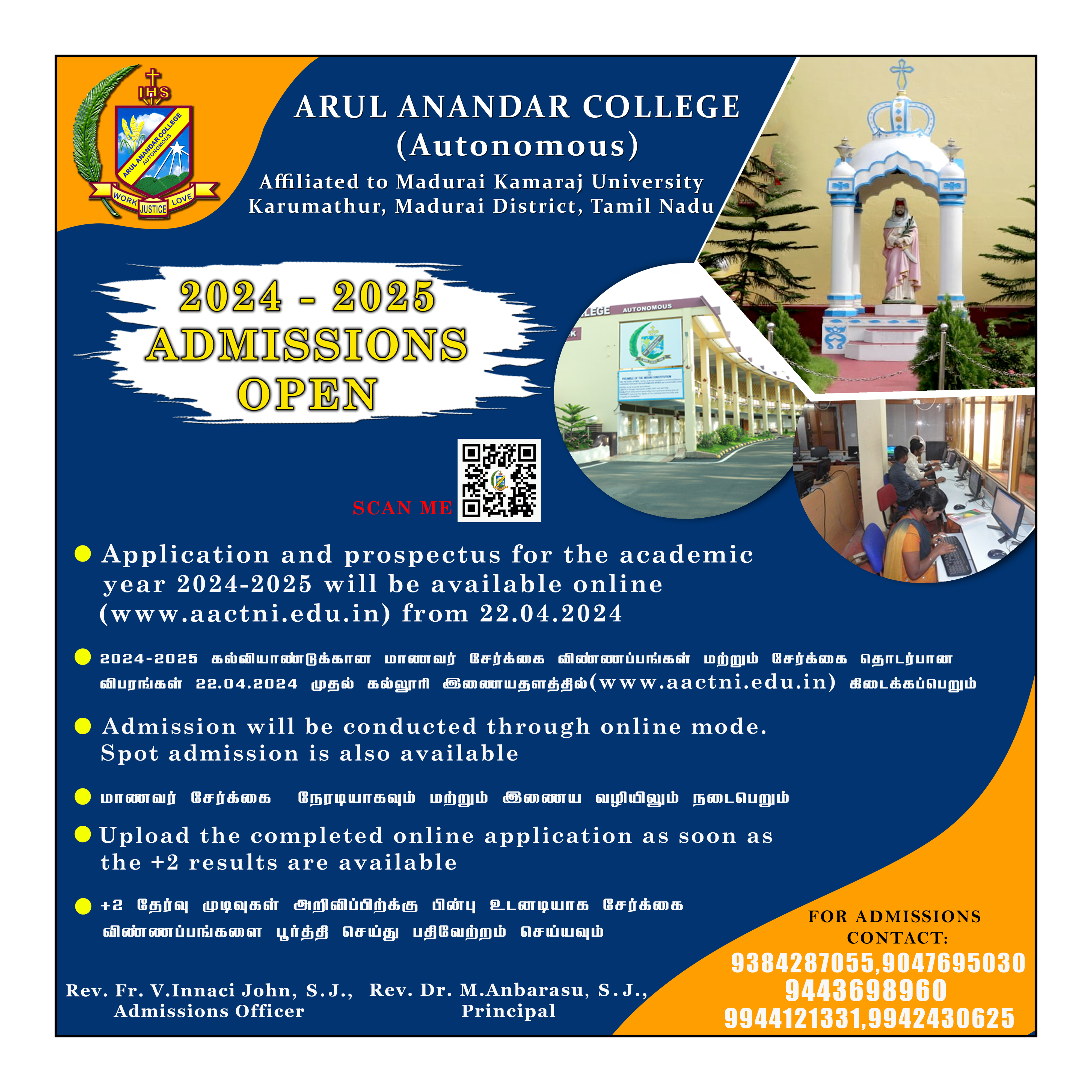





|
Enabling the Rural Marginalized towards Holistic Development The Jesuit vision of “Towards liberation together with the poor” focuses on the empowerment and transformation of the rural marginalized. The College aims at the integrated development of students and society with knowledge, skills and values. There are several strategies through which the college executes this mission. They are: ★Empowering rural students through innovative and socially contextualized education ★Fostering a sense of human rights founded on dignity, equity and justice ★Initiating ICT integrated socially relevant research ★Promoting people-friendly policies and programmes through networking ★ an organic link between the lab and land ★Facilitating gender equity both on and off the campus ★Promoting stakeholders’ participation in academic and extension activities Arul Anandar College begins the task of uplifting the rural marginalized with the admission policies and procedures of opening higher education and research to the Poor, Dalits and Women. The College has charted out unique activities listed below at various levels for relating with the rural marginalised and empowering them with skills, knowledge and services. From Schools to College ★ Summer Camps: Prior to the intake of the first-year students, the RADAR (Rural Action Development and Research), a unit of the College management, conducts summer camps for children who have completed 12th standard to teach them English both spoken and written, to adapt themselves to the college studies. Around 60 students are given training every year. ★ Tuition Centre at Jeyaraj Nagar is another way of motivating school students to higher education. Similarly, the interaction of the second UG students with school students at the adopted villages under ARISE (ARulanandar Initiatives for Social Education) programme induces the school students to continue their studies. ★ Rural School Sports Meet at Arul Anandar College is another entry point to higher education. ★ Admission Procedure is favourably disposed to the enrolment of the Poor, Dalits and Women. ★ Bridge Course in English language before the beginning of UG Programme ensures equal opportunity and special care to the disadvantaged students. It helps the students from Tamil medium at school level to cope with English medium. Career Orientation ★ Soft Skills in view of developing professional skills, career planning and preparation for job interviews are incorporated in the curriculum from 2018. Soft skills and placement training are also given by Placement Cell outside the curriculum. ★ Computer Education is incorporated as a Skill Based Course in all UG programmes. ★ Sixteen Career Oriented Courses are offered to provide employable skills. ★ The Department of RDS offers rural-based job-oriented courses and provides practical training in Poultry, Animal Husbandry, Food Processing and NGO management. The students of the Department are placed in Milk Industries, Agricultural and Animal Farms and NGOs. ★ BSc Food Science and Technology (UGC Innovative Course) is a job-oriented programme. Students are given job placement training in food industries and get job placement. The department runs a nutri-corner selling delicacies prepared by the students as part of their practical under the supervision of its alumni and faculty. Scholarships and Financial Supports ★ Jesuit Educational Support (JES) Management made provisions for Scholarships, Hostel fee Concession, Free Mid-day Meals, and Special economic help to Divyangjan, Economically poor Dalits and Sri Lankan Refugee Students. Scholarship is distributed on the basis of a written policy and procedure. ★ Government Scholarships encourage many students to pursue higher education. The College facilitates as many students as possible to apply for and get scholarship. ★ Endowment Scholarships ★ Other Scholarships (MUTA, Alumni, etc.) Outreach Programmes ★ Women Empowerment: The College is situated in an area notorious for female infanticide and early marriage of girls. To tide over the issues, the College opened its door to girl students in 2001. Many activities are organised for empowering women. Computer Course for Rural Girls (CCRG) is an extension programme conducted for the skill development of rural girls, especially of the school dropouts. ★ Rural Action, Development and Research (RADAR) provides social analysis, social awareness and the empowerment of the poor and the marginalized in the rural areas especially in the fourteen selected Village Panchayats. RADAR also offers courses on Type Writing and Tailoring for the rural students and the students of the college, and Summer Camps and Tuition Centres for school-going children. 1110 students took a course on Type Writing and finished successfully in this five-year term. Among them, 513 students were from the college. Among 324 members who have benefitted from the Tailoring course in this quinquennium, 57 were the college students. ★ Arrupe Centre for Policy Research (ACPR) undertakes research programme relating to rural livelihood. It aims to train farmers and Panchayat leaders, facilitate research with Data Base, and impart skill training to farmers and students. It works closely with Madurai District Coconut FPO (Farmer Producer Organisation) and other FPO, creates multimedia content for farmers, offers internship guidance to the college students, and provides a certificate course on “Life Long Learning for Farmers” (L3F) and a COC on “Fundamentals of Life-long Learning and Open & Distance Learning”. ★ Veterinary Extension (VETEX) provides veterinary medical and other technical assistance to the farmers at a nominal cost. Ongoing academic and research findings of the faculty provide innovative treating practices. Students also get learning opportunities through the centre. The College is committed to the empowerment of rural marginalized students through its academic, research and extension programmes. The College guaranteed the active participation and success of the marginalized through them. By providing education for the marginalized, it aims at social transformation which is an essential element in nation-building, a nation which maintains equality to all its citizens. Arul Anandar College believes that it has performed well in bettering the standard of living of the people through its preferred choice for the rural marginalized. |

Karumathur - 625514
Madurai District
Tamil Nadu, INDIA
principal@aactni.edu.in
arulanandarcollege@gmail.com